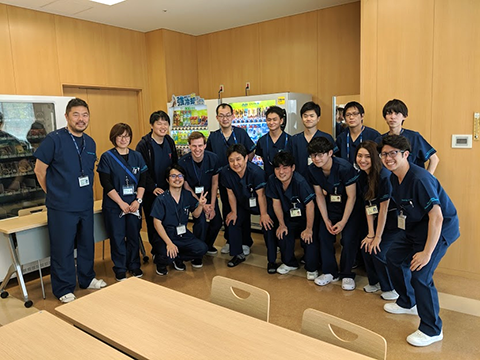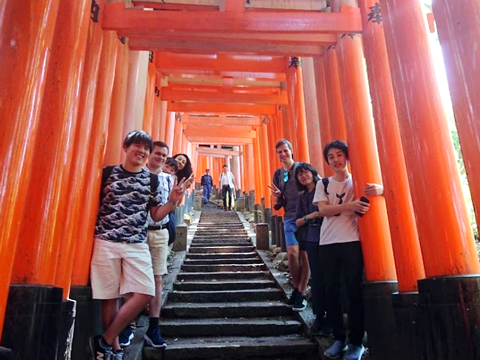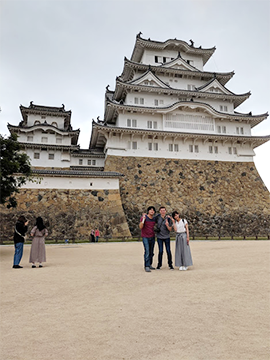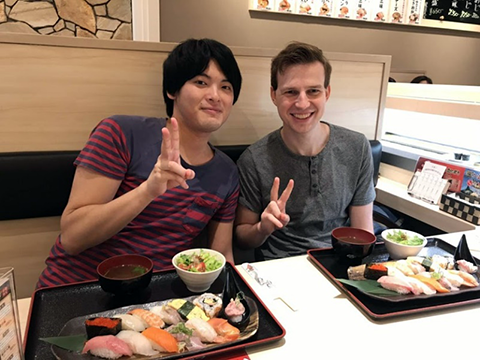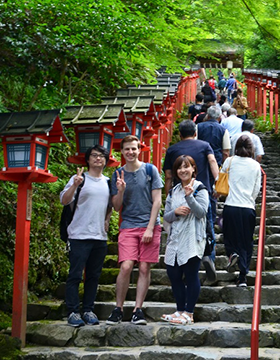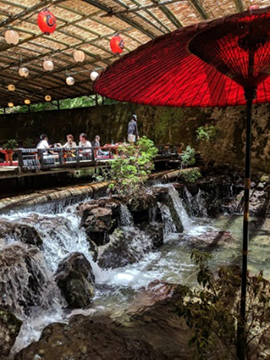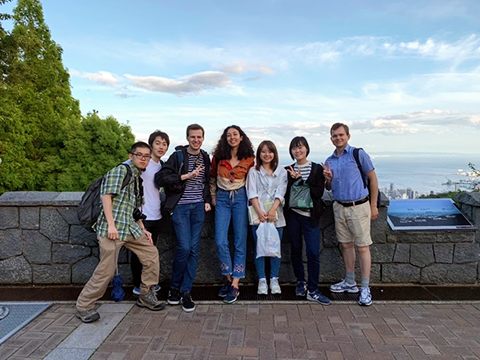国際・国内交流
Matthew Rexroadさん(アメリカ・ロバートウッド・ジョンソンメディカルスクール 第1学年次)
Summer Experience at Hyogo College of Medicine
My name is Matthew Rexroad and I am a rising second-year medical student at Rutgers Robert Wood Johnson Medical School. I’m from New Jersey, USA, love to travel, and have always hoped to study in Japan ever since my first trip there three years ago. From June 3rd to June 28th, 2019, I participated in the clinical training program in the Hyogo College of Medicine Department of Emergency and Critical Care Medicine.
My experience at Hyogo College of Medicine began on the evening of June 3rd when I met Ms. Kyoko Torii, who awaited my arrival at Osaka Itami airport. After twenty-two hours of travelling I was exhausted, but Ms. Torii’s energetic and welcoming personality immediately made me feel excited to be in Japan. She had even brought me dinner, which I appreciated greatly after my long flights. I was shown around the guest house and the Hyogo COM campus and couldn’t wait to get started. The following day I met with Dr. Hirata and Dr. Shirai, two doctors who would serve as my mentors and supervisors during my stay at Hyogo.
Dr. Shirai, the head of the Emergency and Critical Care Medicine department, allowed me to participate in and observe many interesting procedures during my stay at Hyogo. These procedures often involved rare and invasive infections that I had learned about only in the classroom. I was thrilled to be shown how such patients are treated in person, and I was even thanked for my assistance with a few of the cases. This gave tremendous purpose to my stay in Japan and made me feel very fortunate to be participating in such high-quality patient care in another country. Dr. Shirai, as well as his junior resident doctors, helped explain aspects of the procedures to me in English and encouraged me to actively participate in patient care when possible.
Junior and senior resident doctors at Hyogo College of Medicine were some of the most welcoming and friendly people that I was able to spend time with. Many of the resident doctors were my age and quickly became my friends and guides around the hospital. Some of my favorite memories from Japan are from going out for food and drinks at traditional Izakaya style restaurants with the resident doctors. Residents were especially eager to practice speaking to me in English, while I simultaneously practiced my Japanese. I watched them perform a variety of emergency procedures like intubation, lumbar punctures, central line placement, and stabilization of new patient arrivals. Whenever new patients arrived in the emergency department, I would rush over to see the patient along with the resident and attending doctors. I was amazed to see that the procedure of patient interview and stabilization was very similar to what I have learned back home in medical school. Seeing these performed in real life, in another language was a powerful element of cultural immersion.
Watching how new patient arrivals are managed by resident doctors in the emergency department was one of my favorite educational experiences, as I am interested in pursuing a career in emergency medicine one day in America. We managed patients with bone fractures and used X-ray and CT scans to make a definitive diagnosis and establish treatment plans. I watched how patients who suffered trauma from bicycle and motor vehicle accidents are stabilized and managed in the Emergency Intensive Care Unit. I also observed how patients with septic shock and aggressive bacterial infections are managed via administration of antibiotics, intravenous immunoglobulin, and vital stabilization. I found the different types of patient care to be fascinating to watch and enjoyed being able to connect what I have learned in classroom lectures to real patient cases. I also was very interested to learn about how Japan’s universalized model of healthcare varied from the American healthcare system. Observing cases in the emergency department was a great way for me to learn about how accessible Japanese healthcare is, as well as what some of the most common disease presentations are in Japan.
During my stay in Japan I also had plenty of time to explore the country and visit some of my favorite destinations. Having travelled to Japan during two prior visits, I was very excited to have time to experience new areas of the country. While staying at the guest house I made new friends with my fellow exchange students, as well as the students from the Hyogo COM English club who helped to show us around Osaka, Kyoto, and Kobe. Exploring these cities with my new friends was a wonderful experience and I am very grateful to have met so many students who wanted to spend time with me. One of my favorite experiences was hiking up the Fushimi Inari shrine, which lies on the side of a mountain in Kyoto.
The emergency medicine department staff and doctors were incredibly welcoming and friendly travel guides for me, in addition to being excellent clinical teachers. We took two days off from the hospital to travel to Himeji Castle and Kifune shrine, part of Kyoto. I had always wanted to visit Himeji castle and when I mentioned this to Dr. Hirata at the beginning of my stay, he promised that we would go and visit. I greatly enjoyed travelling there with ED doctors and learned about the cultural and historical significance of Himeji Castle to the greater Osaka area of Japan.
We also travelled to Kifune shrine in Kyoto and had lunch at a local Kawadoko restaurant. This was one of the most unique and delicious culinary experiences that I have ever had. In this very traditional style of Japanese restaurant, guests sit down on a large floor of tatami mats that are constructed directly over top of a river and several waterfalls in the beautiful Kyoto mountainside. Emergency department doctors helped me immerse myself into Japanese culture and cuisine in a way that truly made me feel like I was living in Japan.
Overall, my time at Hyogo College of Medicine was the experience of a lifetime. It allowed me to gain a tremendous amount of new clinical knowledge, as well as to experience authentic Japanese culture. The friends that I made and experiences that I had while in Japan are ones that I will carry with me throughout my medical career. I am incredibly grateful to have been welcomed into the Hyogo College of Medicine community and treated not just as another exchange student, but as a friend. I will never forget the memories that I made while in Japan. I would especially like to thank Ms. Torii for organizing and planning my stay with the emergency department, Dr. Shirai and Dr. Hirata for their leadership and mentorship, and all of the resident doctors and staff who welcomed me to the hospital with open arms and made my stay so enjoyable.
